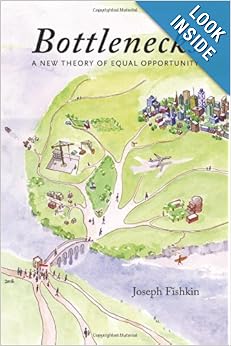Yes, you read that headline correctly. This post explores how Joseph Fishkin’s new theory of equal opportunity applies to… copyright law. As I hinted earlier, this is seemingly an unlikely connection. It is thus a connection that uniquely demonstrates the generativity of Bottlenecks.
 Other posts in this symposium by Wendy Greene and Jessica Roberts have explored how Bottlenecks applies in the context of workplace anti-discrimination rules. Brishen Rogers extends the workplace focus by exploring how labor unions fit into the theory. And my own earlier post connects Bottlenecks to legal education reform.
Other posts in this symposium by Wendy Greene and Jessica Roberts have explored how Bottlenecks applies in the context of workplace anti-discrimination rules. Brishen Rogers extends the workplace focus by exploring how labor unions fit into the theory. And my own earlier post connects Bottlenecks to legal education reform.
Copyright scholarship, however, is not where we expect to encounter a new theory of equal opportunity. Yet that is where I found myself applying Fishkin’s framework, which finally provided the language and conceptual clarity to express what struck me as so profoundly problematic within my own field.
Copyright protection is conceived as the dominant incentive for creative production. Even works that are importantly subsidized by alternative incentive schemes — government funding for the arts, faculty scholarship, user-generated content — end up having copyright applied to them, in the name of enhancing incentives for creativity. But our field has not spent much time thinking about the implications of copyright protection for distributive justice and equal opportunity.
In Copyright and Inequality (forthcoming from Washington University Law Review) I argue that by driving up the cost of books, copyright protection is systematically depriving people with lesser purchasing power of opportunities to read. On its own, that might not seem like a big deal: there are plenty of other leisure activities to engage in. It becomes a bigger deal, however, when you realize that reading is a bottleneck to accessing so many other life opportunities. This is how we develop fluency with the written word that helps us pass those Big Tests, pursue education, and obtain jobs. It’s also how we get to less directly employment-related opportunities, like the ability to acquire knowledge and participate in cultural life.
The problem is particularly severe for people whose native language is among what I term the “neglected languages” of book publishing. The analogy is to the problem of “neglected diseases” identified by patent scholars and health advocates. R&D on first-world ills such as baldness and impotency is strongly incentivized by IP rights; not so for poor people’s diseases such as malaria and tuberculosis. Similarly in the area of copyright and cultural creativity, there are literally millions of books available for English readers, but less than a thousand in Zulu.
Copyright largely fails to incentivize the creation of new works in many languages, while also erecting legal barriers to translation. This further cements the problem of language acquisition as a bottleneck to larger opportunities. Bottlenecks explores this topic in the American context, where recent immigrants and children of immigrants face hurdles. But in Africa, most children start school in a foreign language. The lack of reading material in the continent’s native languages is a major hurdle to expanding educational opportunities.
Copyright law thus creates bottlenecks to broader educational, cultural, and work opportunities in a number of ways. It raises the price of reading to a level where many people are excluded. And restricts the flow of information to fewer languages, requiring members of disadvantaged groups to master a foreign language in order to pursue education and learning. Bottlenecks gives us a framework for bringing a social justice perspective to a field far removed from the traditional ambit of equal opportunity law, by focusing on its unintentional impact on broader social opportunities.
Copyright law may not rank among the most significant bottlenecks structuring unequal opportunity today. Indeed, focusing on any specific bottleneck carriers the risk of seeming to focus on a topic of minor importance to the overall cause of social equality. Yet as Fishkin argues, the greatest potential for effective legal and policy reforms lies precisely in understanding and attacking specific sites and mechanisms of unequal opportunity. Copyright and Inequality takes up this task within my own area of the law.


















